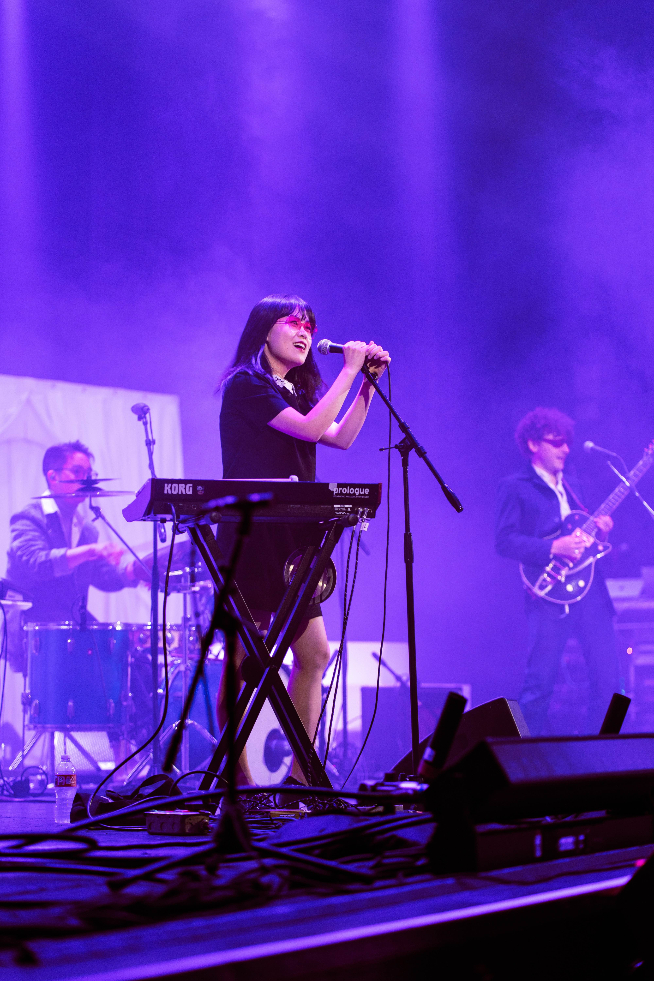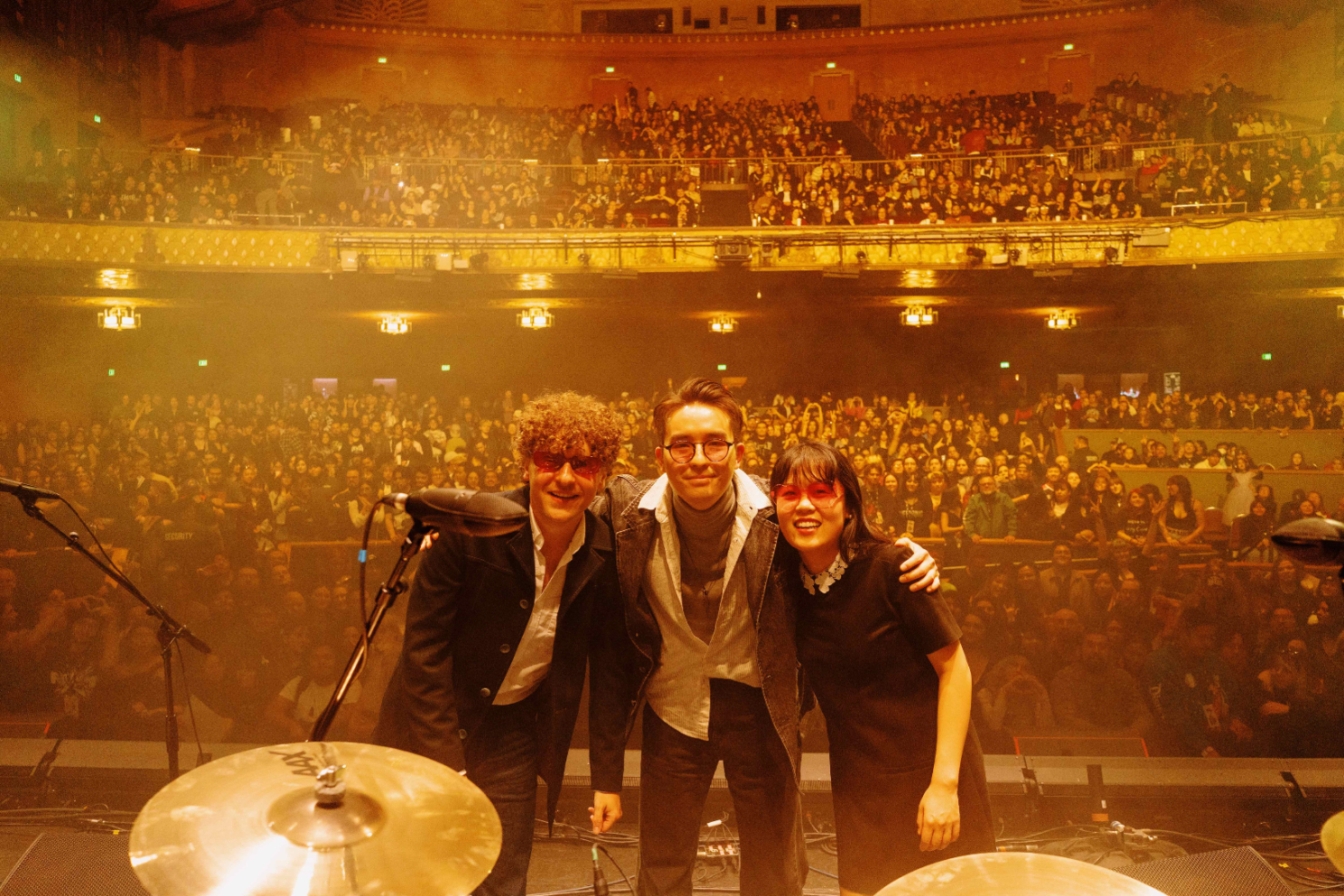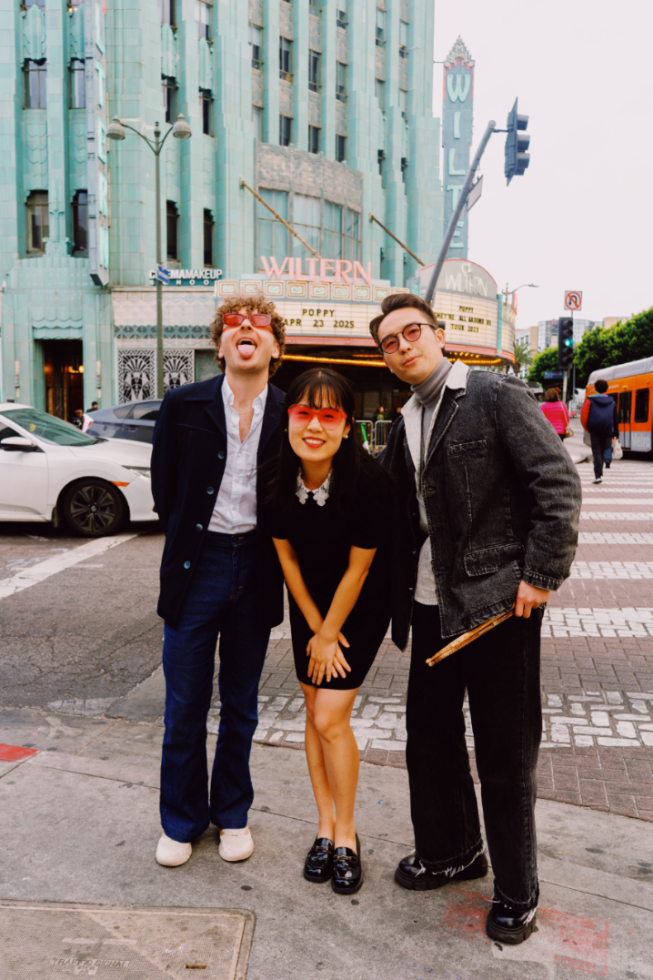One look at Chinese American Bear, and it would be difficult to peg them down as what one would call a “traditional” band. The musical brainchild of Anne Tong and Bryce Barsten have modest origins: growing up in suburban Seattle as school orchestra students with nothing to little in common – but that’s precisely what makes their music so organic. Now a married couple, Tong brings her Chinese roots infused with Barsten’s llama farmland upbringing to create a sound that not only has a pastoral ruralness to it, but brings about an innocent sunshine-filled tinge evoked through Tong’s Mandarin lyrics.
But as I approach the Wiltern Theatre to meet them at their show, I’m taken aback by the clientele that line the sidewalks leading up to the doors: face-paint, fake blood, and black leather stand around idly. As I look up to the marquee, I’m surprised to see who they’re opening for tonight: heavy metal princess Poppy.
If you’ve never been inside the green room at the Wiltern, you could mistake its concrete, cavernous-like tunnels for a bunker. As Poppy’s chest-vibrating, death from above bass from just upstairs rattles every bit of the green room, one could assume a war rages outside.
But there isn’t. In this moment, I’m in the happiness-assured heartland presence of Chinese American Bear, whose synth-laden soothe-ness is the exact antithesis of what’s blaring through the walls.
“We got invited,” Tong admits unashamedly, whose private school girl outfit she now dons has become a signature look of Chinese American Bear’s live show. “[Poppy’s] booking agent reached out to our booking agent and was like, ‘Poppy’s a fan of you guys, are you guys free on these four dates?’ And we were like, ‘Uhhh…’
“Also, just getting to play the Fillmore and the Wiltern… these are bucket-list venues for us. So we were a little nervous… well, not nervous. Nervous is the wrong word, just, ‘how would her fans react to us?’ And the first night at the Filmore, people show up with blood on their faces and face paint… and they’ve been so welcoming. Metal fans are the nicest people.”
“I mean Poppy… she’s not really a metal artist, she’s an experimental artist,” Barsten chimes in, much more relaxed in a casual button down. “I just think she’s all about… maybe not genre-bending, but genre hopping. So I think it makes sense that she was okay with us opening for her.
Having been signed to Modern Sky (the largest indie label in China) prior to releasing their latest album Wah!!!, they caught the attention of UK’s Moshi Moshi label, bringing them into a sphere of further international touring and exposure, a far cry for a band who made their first record’s masters free.
“I don’t know if you know King Gizzard and the Lizard Wizard…” Barsten inquires.
Very much so.
“They did this with a couple albums… where they just released the masters for free, and just said ‘y’know if any small label or any individual person wants to press some vinyl or sell it at their shows,’ they can. And to me, I just love this idea of community and it just feels like their kind of breaking the mold, y’know? We made the entire album ourselves, we spent no money on it because we did everything ourselves. We didn’t even mean to really start this band.”
“It was very unintentional, our first album,” Tong finishes Barsten’s thought. “It was just for fun.”
Now, however, the rules have changed.
“I wish [we did that] for the second album,” Barsten responds. “But now that there’s…” he tries to find the right words, “…people involved, it would be a hard pitch. ‘Hey, can we amend this contract so that we can give people the masters for free?’” he mimics with a laugh.

Having just played San Antonio and Tempe, with San Francisco to follow (as well as a dozen dates before this one), living life on the road is challenging enough as it is, but handling a marriage is a world away in and of itself. But to handle them concurrently?
“Rex keeps us stabilized,” Barsten jokes. To the left of them joins Rex Liu, their drummer for the tour, and the only one in Chinese American Bear properly raised in China.
“Y’know… we just work really well together,” Tong clarifies. “I never have those feelings of ‘oh I need time away from him.’”
“When we get space from each other, it’s nice,” Barsten follows up. “But we’re never like, ‘oh we need space now,’ y’know? When you’re touring and stuff, it’s a lot of work. So you’re kind of just in a different mindset. You’re almost a little more in that professional brain. You’re just operating to try and make everything work and work as a team and make the show successful and make sure everything’s happening. So the relationship part is kind of put to the side.”
Which, despite being an unconventional couple, they fit Barsten’s description to a tee: the two finish each other’s sentences, anticipate each other’s responses, and communicate in a way that feels almost telepathic.
But there’s another strategic advantage in having a band as a couple. Aside from knowing each other on an intimate level, the length of knowing and working with someone develops a fluent musical prowess and workflow between the two: a solid foundation for trust and stability.
“I feel like you used to put rules on yourself,” Tong confides in Barsten. “Because I feel like you used to write music based on what you’d think it should sound like, versus what was authentic [to you].”
Barsten shifts in his seat: “Yeah, I feel like a lot of artists, or a lot of writers, go through this. You try and sound like people. You’re like ‘oh I love that,’ and then you write a song just like that. Maybe you take inspiration from two or three bands. But I feel like you’re always trying to emulate, and I feel like this was the first band I both stopped doing that but also took some of the parameters off of what’s conventional.
“I just feel like I was always thinking ‘how will people like this?’ It’s an interesting aspect of psychology of writing music and being an artist. I think finding your authentic writing voice is really hard. You’re battling fear, because maybe you feel inadequate. And I feel like this is the first band I’ve been very fearless in. And it’s been the first band that’s ever started to work out a little bit.”
In Barsten’s other words: “the harder you try to make something work, the less well it will work.” But is that detached mindset essential for making something that lasts?
“I don’t know if essential, because there’s so many artists that are part of a big machine where it’s much more curated and it works if people still like it, but I don’t know… It’s hard to say if it’s that black and white, y’know? It might be really grey.”
The result? Both subjects releasing their inhibitions – two individuals bringing out the best in each other and encouraging one another to dig deep into their roots. The C-pop lullabies strewn atop mosaic sound palettes make for an unexpected, yet vibrant contrast and dissonance – a whole greater than the sum of its parts.
C-pop in the United States, however, is still unfamiliar territory.
“So we toured China for the first time this past December,” Tong goes in. “And what we learned is China still feels in many ways like a closed society. Simply because they use all of their own social media platforms. You can’t find Instagram there, Spotify doesn’t exist there, they have their own music streaming platforms, so it’s really hard for emerging bands to promote themselves overseas. Even the labels we met, the labels would ask us questions on how to get on Spotify, promote oversees. And also, because of the closed system there… a lot of the music that comes out of mainland China sounds a little dated, because they don’t have much exposure to overseas music either. So it doesn’t sound quite as edgy.”
“It’s like stuck in some time period,” Barsten adds.
“Taiwan is different. Taiwan has all of the platforms that the west does. And so Taiwan has amazing emerging cool bands and we know a lot of Taiwanese bands who have toured overseas. But if we’re talking about C-pop from mainland China, I think it’ll be really hard for that to come over. So we almost have to make pop music here with Chinese influences.”

But that shouldn’t deter anyone from discovering the different kinds of artists coming out of China and Taiwan today, a scene that’s still active and present as ours.
“I’ll start with my favorites,” Rex exclaims. “Deca Joins, Sunset Roller Coaster… Elephant Gym, because that’s a math rock band. I love it.”
“We also like the Chairs,” Tong adds. “Again, we started this band without any intention, but what we’re realizing, y’know, K-pop is so big oversees, and Japanese culture has always been exported oversees since the 90s, like anime, Pokémon, etc. And there hasn’t really been edgy art with Mandarin, so we were really trying to lean into that, making the Chinese language, the mandarin language, cool and edgy.”
Language as a vessel for change.
“The first time I heard [Chinese American Bear] was years before I joined this band,” Rex adds. “I was like ‘wow this is new, this is something not heard before.’ All the Chinese pop music, they’re trying to make deep, philosophical… lyric first [music]. Or more about love and emotions. And I had never heard somebody use this easy to understand, very simple Mandarin to actually write such cool music.”
“For the non-mandarin speakers, our Chinese lyrics are very basic, very simple,” Tong explains. “They almost have a child-like quality to a native Mandarin speaker. And because I grew up [in the U.S], my vocabulary is very limited, I don’t have the vocabulary to write about deep, philosophical, nuanced things. And that’s why we sing about food, and fun, dancing things. So part of it is just my own language constraint, but I think that’s what makes us stand out.”
In addition to a tour with Poppy, a spring UK tour, and a summer North American tour, Chinese American Bear also landed a sync spot in the Bowen Yang-led Dinner Banquet, a remake of the 90s Ang Lee film which had its premiere at Sundance earlier this year.
“The music supervisor for the Wedding Banquet, her name is Tiffany [Su], found our music from our sync licensing agent and really liked it,” Tong resumes. “And we were so honored. And this was especially really sentimental for me personally, because I grew up watching the original Wedding Banquet. I remember tearing up, like ‘wait, what? They want to use our music?’ But [writer/director] Andrew [Ahn] was telling me what he loved about our music is the spirit that he tried to impart in the movie: the spirit of The Wedding Banquet is really playful, fun, quirky, but also has heart. And that’s the same kind of description we’ve heard about our music: people love how quirky, silly, and fun we are, but there’s a depth to the music itself.”
But the most surreal thing isn’t necessarily their integration with Hollywood, but the entire trajectory Chinese American Bear has taken over the last year. From being featured on Lauren Laverne’s show on BBC Radio to playing sold out A-tier venues, their rise isn’t contributed from L.A. or music industry insiders, but in how they make their audiences feel.
“For our live shows, one thing that I always want to make sure is I never want my audience to feel bored,” Tong confesses. “Because I have myself been to shows where I’m kind of a little bored, or I’m feeling not too into the music and I’m just kind of waiting for the set to be over. And so, I really want all my shows to be really interactive, I’m always thinking about the audience, how to keep them engaged. And so I teach them dance moves, I bring up a dumpling dancer, and I throw plushees into the audience too.
“Also if we weren’t really silly on stage, I feel like we give permission to the audience almost for them to be really silly. Because I think sometimes when you go to a show you might feel a little self-conscious about dancing. And I just want people to have a fun time and loosen up, so they can see that we’re being really silly and dancing.”
To the rest of the world, it would be hard to construe Chinese American Bear as just “another band.” But to them, it’s another day as a married couple on the road of life. The next night they’ll play to a sold out crowd in San Francisco, converting yet another legion of fans. They’ll go onto a UK tour and return with international acclaim. Their music will have been heard on thousands of movie screens across the country, and by year’s end, they might even become a household name.
“I just want people to have a fun time… audience first,” Tong finalizes.
Chinese American Bear’s latest EP, Waaaaaaaah!!! is available now via Moshi Moshi Records. They’ll be playing at Timber! Festival and THING in Carnation, Washington on July 25th and August 9th, respectively.
Featured images courtesy of Sheva Kafai
